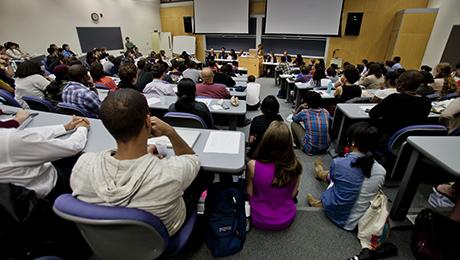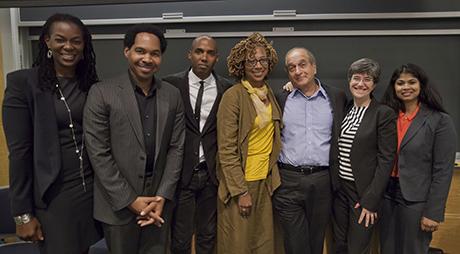Racial Justice on Trial
Columbia Law School Professor Kimberlé Crenshaw and a Panel of Legal and Interdisciplinary Experts Discuss the Need for a New Social Change Strategy.
New York, October 24, 2013—A Columbia Law School roundtable discussion on racial justice and the courts brought together experts in civil rights practice, social psychology, and institutional reform to probe strengths and weaknesses in race-based litigation strategy.
Professor Kimberlé Crenshaw, a critical race theorist, moderated the event, “Racial Justice on Trial.” She set the stage by reviewing race-related decisions from the summer of 2013 on affirmative action and voting rights at the U.S. Supreme Court, stop-and-frisk in New York, and the jury acquittal of George Zimmerman in the killing of Trayvon Martin in Florida.
“What are the implications of these legal decisions for racial justice in America?” asked Crenshaw. “What is left to do to maintain and sustain a progressive movement for social justice?”
| The discussion packed the room at Jerome Greene Hall |
In a far-reaching discussion, the participants each examined racial justice from their own perspective.
Columbia Law School Professor Theodore M. Shaw, former president of the NAACP Legal Defense Fund, said a “dishonest discourse” over race arose in the courts as early as 1978, with judges asserting that race-based remedies were no longer necessary. This refrain returned this past summer, he said, in the opinion of Supreme Court Chief Justice John G. Roberts, Jr. when a majority overturned significant protections in the Voting Rights Act.
Realizing how legal standards have been eroded over time is important in evaluating the success or failure of cases today, said critical race scholar Devon Carbado, a professor at UCLA School of Law. Decisions from the 1960s permitting expanded police authority, for example, significantly stripped the Fourth Amendment, but formed the precedent for recent challenges to the stop-and-frisk policy overturned by a New York federal judge in August.
A cleavage in equal protection jurisprudence may be developing, said Professor Russell Robinson of UC Berkeley School of Law, who pointed out that gays and lesbians have fared well in court recently while plaintiffs in race-based cases have suffered setbacks. LGBT advocates have been successful, he said, because of powerful movement building.
Outreach and community organizing were, in fact, central to the positive results in the New York stop-and-frisk cases, said Sunita Patel, a lawyer at the Center for Constitutional Rights who worked on the case. Litigation cannot replace legislative advocacy, grassroots activism, or active problem-solving with the clients who are directly affected, she said.
Even with courtroom victories, implementation of race-based decisions is difficult. Securing actual on-the-street justice with the stop-and-frisk policy will require significant structural changes, according to Columbia Law School Professor Jeffrey Fagan, whose expert testimony was relied on by the plaintiffs in the case. Institutional bias and ingrained habits in the police department are, he said, “the knot to be untied.”
Another perplexing problem in racial justice litigation has to do with “implicit bias,” said Valerie Purdie-Vaughns, a psychology professor at Columbia University and a researcher on racial bias. Implicit bias is observed in thoughts, opinions, and behavior but functions outside of consciousness, she said. It can affect how resources are allocated, for example in policing assignments, and how police—and citizens—perceive danger and threats.
The final speaker, Columbia Law School Professor Susan Sturm, head of the Center for Institutional and Social Change, said progress on racial justice will require lawyers to think about how to redesign systems and organize social change at multiple levels.
| (L-R) Speakers Valerie Purdie-Vaughns, Russell Robinson, Devon Carbado, Kimberlé Crenshaw, Jeffrey Fagan, Susan Sturm, and Sunita Patel. Not pictured: Theodore Shaw. |
After the session, Crenshaw said approaches to racial justice are going through a period of transition.
“Traditional equality litigation has lost its ability to deliver justice,” she said. “The law needs to broaden its parameters about race and how it functions. It’s a new arena for battle.”
The Oct. 7 event was sponsored by the Center for Intersectionality and Social Policy Studies, Center for Institutional and Social Change, Columbia Journal of Race and Law, and the African American Policy Forum. Additional support provided by the Asian Pacific American Law Students Association, Black Law Students Association, Civil Rights Law Society, Institute for Research in African American Studies, Latino/a Law Students Association, Law in Africa Student Society and the Worker's Rights Student Coalition.

